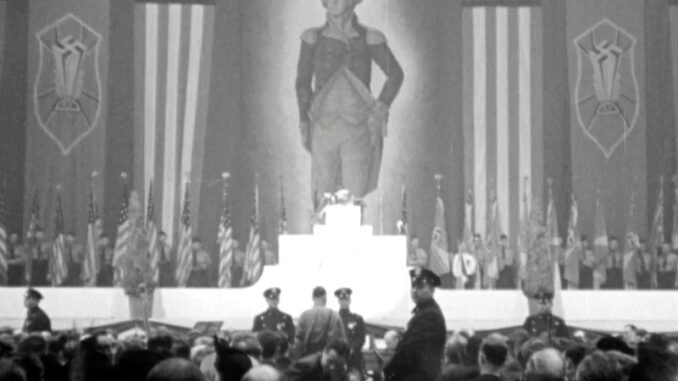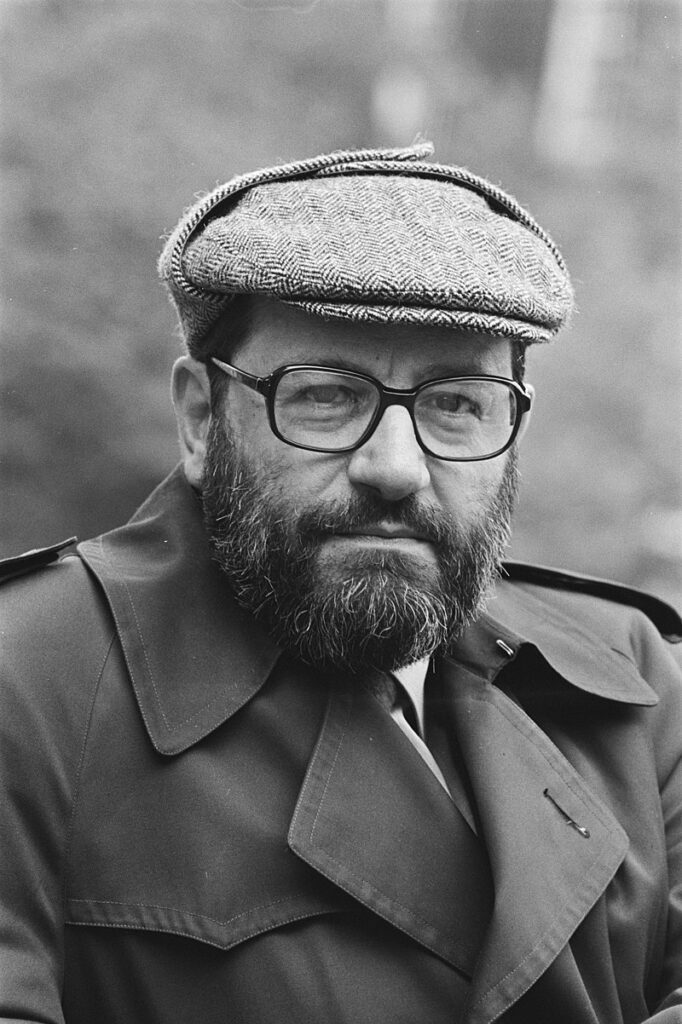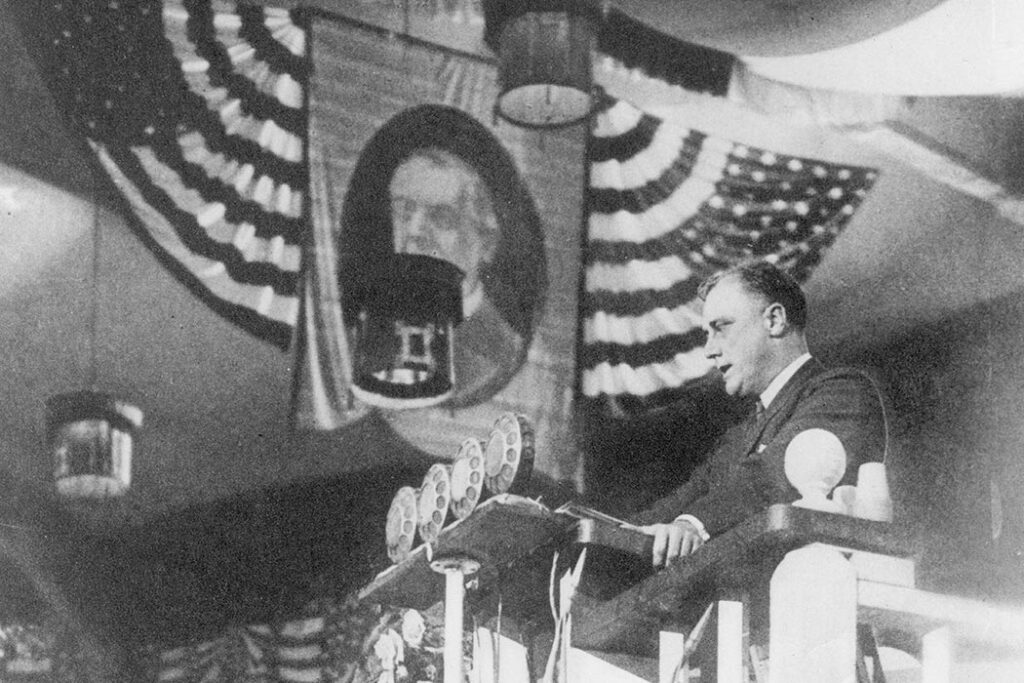
Estimated reading time: 17 minutes
Umberto Eco’s famous essay, Ur-Fascism, was published 28 years ago this month. In it, Eco ascribes common characteristics to fascist movements throughout history, so that future emergences of fascism may be identified and stopped. Unlike analyses of fascism more popular among Marxists, such as those of Georgi Dimitrov and George Jackson, Eco’s approach doesn’t utilize the analytical method of historical materialism. This is the notion that history transpires via the struggle of different social and economic classes, according to their relationships to production and economic systems in place at a time. Instead, Eco concerns himself with semiotics and metaphysics — the cultural and philosophical riverbed through which fascism sometimes trickles or sometimes surges, but always moves as liquid.
Though dismissed by some Marxists as abstract or arbitrary, this technique has merit and utility. After all, fascism does not flourish through political economy alone, and is the most metaphysical and symbolism-obsessed of bourgeois ideologies. A study of it that neglects these elements would be dangerously incomplete. At worst, neglecting the semiotics of fascism leads to the kind of rhetoric recently seen in the New York Times, whose propagandists launder the totenkopfs and sonnenrads of Ukrainian soldiers into harmless icons. Such purposive negligence encourages the creep of fascist rot until fascist tropes are ubiquitous in western culture; it soft-pedals the ideas associated with these symbols to liberal society at large. It’s exactly this phenomenon which Eco seeks to safeguard his readers against, when he counsels that “Ur-Fascism is all around us, sometimes in plainclothes,” and that, “Ur-fascism can come back under the most innocent of disguises.”

Ironically, Eco’s perspective falls fatally short. His position, as someone who was liberated from Italian fascism by American troops, ultimately blinds him to the glaring, unavoidable truth of his own conception of fascism — that the United States is the progenitor and wellspring of it. Such blindness to ideology is quintessential of liberalism. However, all is not lost! Eco’s work, although limited by his liberal framework, still provides a useful tool to fill crevices in the materialist understanding of fascism. Furthermore, applying Eco’s lens back to the United States strikingly clarifies the meaning of fascism, especially American fascism.
Why is this necessary? Understanding fascism is requisite to eliminating it as a political possibility. American fascism is a cancerous blight that must be totally eradicated, lest even a germ of it survive, enabling it to regenerate. By introducing a Marxist framework, we can avoid these pitfalls and supersede Eco’s model of fascism.
Eco posits, “the fascist game can be played in many forms, and the name of the game does not change,” and “Fascism became an all-purpose term because one can eliminate from a fascist regime one or more features, and it will still be recognizable as fascist.” What are these features? Eco identifies fourteen signifiers of fascism, all of which are incandescent with Americana.
The first of these features is “the cult of tradition.” American “culture” possesses this feature in abundance. This is the fixation upon an imagined ideal past way of life, blended with paranoid xenophobia. The “American Dream,” encapsulated in the stereotype of an idyllic suburban American landscape — a house in the suburbs with a white picket fence, a nuclear family, a dog, etc. — must be under attack from Black, indigenous, other racialized peoples, and LGBTQIA people. Conspiracy theories about “crime rates” and “gangs,” “antifa” and their “shadowy” “handlers” and “financiers,” are inevitably modern substitutions for the “Judeo-Bolsheviks” of the Protocols of the Elders of Zion. Eco at least realizes that historic fascists such as Julius Evola, “merged the Holy Grail with The Protocols of the Elders of Zion, alchemy with the Holy Roman and Germanic Empire,” but fails to condemn the verdant American tradition of doing exactly that. In Eco’s time, writers such as John Keel and Milton Cooper engaged in this practice through works like The Eighth Tower, and Behold! A Pale Horse. Today, the paranoid aspect of fascism is alive and well in the conspiracy theories peddled by figures like Alex Jones and Joe Rogan, and there’s no shortage of Petersons, Carlsons, Tates, and Shapiros to choose an imagined “traditionalist” culture from.

Eco’s first tenet reflexively suits the rightwing elements of American society, but it would be remiss to not point out that moderate, liberal America is also deeply embroiled in its own cult of tradition. Although the enemies are less abstract, less fantastical — China, Russia, and Iran are real geopolitical entities, and they really do pose “threats” to America’s imperialist hegemony — the mythologized America which confronts them is no less of a fiction than the American Dream described above, and the enemy’s characteristics are exaggerated to the point of caricature. America’s “enemies” are spoken of as a biblical “Axis of Evil.”
The second feature of Ur-fascism, closely related to the cult of tradition, is the rejection of modernism, but this might be better understood as “the seeming embrace of progressiveness, when one’s true ideology is lebensraum.” Eco correctly ascribes this quality to Nazi Germany, but fails to apply it to the United States, which was built on an eliminationist genocidal program against North America’s Indigenous peoples. In fact, when crafting their lebensraum policy — their plan to clear, by genocidal means, most of eastern Europe, Russia, and the Caucasus for German colonization — the Nazis took direct inspiration from the history of American colonialism. Eco failed to see this connection because he wrongly believed that America’s 1776 War of Independence was progressive, and so assumed, wrongly, that the resultant state must also be inherently progressive. To accept that the United States must be progressive apriori is a sign of irrationalism, and it is, ironically, irrationalism of this kind that is the third feature of fascism.
Eco conflates the notion of irrationalism with “distrust of the intellectual world [which] has always been a symptom of Ur-Fascism, from the Nazi leader Hermann Goering’s alleged dictum, “When I hear talk of culture I reach for my gun.” Irrationalism so permeates American culture that it scarcely needs elaboration. It is on every American television station, suffused through every piece of media. Every piece of red scare propaganda, of anti-vax propaganda, of anti-trans legislation, of anti-abortion legislation is justified within a miasma of irrationalism.
The fourth feature of Ur-Fascism is the idea that “disagreement is treason.” Due to fascism’s insidious nature, it’s easy to miss that no meaningful dissent is possible in American society. The subjugated populace believes they have the capacity to disagree, or even shape their society democratically, when nothing could be further from the truth. One needs to look no further, for recent and present examples, than the Supreme Court overturning Roe v. Wade, or the building of Atlanta’s “Cop City” against the popular will of Atlanta residents and over the bodies of murdered #StopCopCity activists. In America, the people’s democratic will is regularly stifled, criminalized, and, as in the case of Atlanta forest-defender Tortuguita, repressed by outright police murder.
Eco’s fifth feature of fascism is racism.

Sixth is the “appeal to a frustrated middle class.” Notwithstanding that the existence of “a middle class” already implies the presence of fascism, and is an ambiguous category that serves to obscure class exploitation, the sole political project of both major American parties is to appeal to “the individual or social frustration” of “middle-class” Americans. Rarely does an American politician make reference to a “working class,” and when they do, it serves only as a rhetorical tool to obfuscate real class character.
The seventh feature, (settler) nationalism, emerges from the appeal to the middle class. Characteristic of fascist nationalism, according to Eco, is “obsession with a plot”. Fascist politicians and fascist propagandists frequently speak of America as not merely a “nation,” but also a “story,” a “promise of opportunity,” and so on, with its own “destiny.” Even America’s “founding fathers” spoke of their project this way. Fundamentally, America is not a nation, but a colonialist project, built upon the mass enslavement of Africans, the eliminationist genocide of North America’s original peoples, a white supremacist legal regime, and centuries of racial oppression. This is connected to the cult of tradition’s paranoia and xenophobia — enemies, both internal and external, are attacking American “freedom” and “democracy.” Taking Russiagate and Trump’s January 6th, 2021 putsch as examples, it’s apparent that plot obsession is a bipartisan phenomenon.
The eighth feature relates closely to nationalism and nationalist plot obsession. It’s the necessity of describing fascism’s enemies as simultaneously pathetically weak and “degenerate,” yet simultaneously, overpowering, omniscient, and existentially threatening. For example, the western news landscape has been overrun with stories that portray Russia’s invasion of Ukraine as a terrifying existential threat to western civilization, and yet equally commonplace are tales of the supposed ineptitude of Russia’s military leaders, the cowardice of its soldiers, its inability to follow-through on its objectives, and so on. “Fascist governments are condemned to lose wars because they are constitutionally incapable of objectively evaluating the force of the enemy,” Eco writes, aptly describing American strategic defeats in Afghanistan, Iraq, and Vietnam, and likely describing the forthcoming defeat of the NATO-led proxy forces in Ukraine.
However, neither victory nor defeat in any particular conflict matters to America. The United States is fascist, and for the fascist regime, “life is permanent warfare.” Thus, there was only a five month pause between the American defeat in Afghanistan in September 2021 and the ignition of the Ukrainian proxy war in February 2022. After that conflict, another will inevitably emerge, perhaps against the People’s Republic of China over America’s puppet state in Taiwan. Life as permanent warfare permeates not just the “hot” conflicts, but all elements of American day-to-day life and culture. Militaristic language and attitudes apply everywhere: the “war on cancer,” the “war on drugs,” the “war on crime,” the “war against family values,” and so on. America will never be at peace, internally or externally, because America can never be at peace. This state of “forever war,” Eco’s ninth feature of Ur-Fascism, is inescapably and unmistakably American.

The tenth feature, “contempt for the weak,” feeds America’s social militarism. Eco explains that in the fascist regime, “every citizen belongs to the best people of the world, the members of the party are the best among the citizens, every citizen can (or ought to) become a member of the party.” In America, one merely needs to replace “the party” with the parties — the Democratic Party and the GOP — and everything becomes clear. Americans are all the best people in the world, and the best among those people are the ones who proliferate and defend the American political project, of which there is only one, despite the apparent duopoly. This category includes those who join the police or the imperial military, but it also includes those committed to ideological work, such as lobbyists and propagandists. It also includes the propagandized masses, whose mission is to assure the ascension of their guy to the president’s sacred office. As the fascist leader’s existence depends upon the weakness of the masses, and contempt for the masses so too does the president’s. Everyone in America must hierarchically despise their underlings, who are actually their peers, and those underlings must further subjugate their inferiors, who are actually their comrades. “This reinforces the sense of mass elitism” without mentioning American society’s contempt for the disabled, neurodivergent, LGBTQ people, etc. who also have these strictures of loathing foisted upon them.
In the same fashion with which “the duopoly” previously supplanted the place of “the party,” “billionaire” replaces “hero” in the eleventh sign. “In such a perspective everybody is educated to become a hero” but in America everyone is educated to (want to) become a billionaire — an arch-exploiter. Such a desire is inhuman and ecocidal, and condemns billions of people to death as surely as if they’d been shot on the front lines.
Since becoming a billionaire is only a possibility for 0.00000218072% of Americans, fascism must “transfer its will to power to sexual matters.” The twelfth sign of fascism is sex and gender intolerance. There is a continual and increasing genocide against trans people in the United States. It is of no import that no Institut für Sexualwissenschaft has been razed on American soil – the slow corrosion of trans rights, access to medicare, ability to hold jobs, and increasing precarity of existence ensures that no singular explosive act is necessary. However, as general conditions deteriorate in the United States, the fascist frustration will increase, and there will be more socially condoned violence against trans people.
The thirteenth feature of Ur-Fascism according to Eco is selective populism — when individuals as individuals have no rights, when they cannot take action as individuals, but only roleplay as “The People.” Take, for instance, the normal course of an election cycle in the United States: The people ostensibly elect politicians to act according to their common will, and the leader of the elected political group, the president, becomes the arbiter of that will back to the people. Trump played this role with such bloated grandiosity and infamy that his personality eclipsed the truth that every American president performs this function identically. Trump’s “respectable” predecessors, Barack Obama and George Bush, also acted as personal embodiments of “the American People.”
Eco suggests, “wherever a politician casts doubt on the legitimacy of a parliament because it no longer represents the Voice of the People, we can smell Ur-Fascism.” This is true. However, because each American president already behaves identically to Trump, his dispute of the 2020 election should be considered adding more garbage to a smoldering dumpster fire, rather than sparking the first flames.

The fourteenth and final element of Ur-Fascism is “Newspeak,” an Orwellian term that Eco describes as an “impoverished vocabulary and an elementary syntax.” Eco himself failed to identify the impoverished anti-Communist fiction of Orwell with British fascism, just as he failed to identify American fascism. That said, Newspeak, as Eco defines it, is indispensable to American fascism. Take, for instance, the neologisms “woke,” and the derivative “wokeism” and “wokescold,” which in American fascist Newspeak means, more or less, “to be against racism, misogyny, and other bigotry.” Newspeak serves to turn what is unobjectionable to most people into something sinister and threatening. Examples abound: “critical race theory,” “J6,” “Hunter Biden’s laptop,” “gender-critical” — Newspeak continually invents new boogeymen and generates whole irrelevant discourses about how they must be destroyed to “save America.” In this way, Newspeak inhibits the masses from achieving even an elementary political literacy, which is essential for fascists to maintain their power. A population that lacks the political language to describe its conditions cannot liberate itself from those conditions.
Eco asks, “Is there still another ghost stalking Europe (not to speak of other parts of the world)?” implying that fascism is akin to Marx’s famous “specter of communism,” haunting western liberal society. This is a false equivalency. Fascism is no ghost, nor does it haunt liberals. Instead, fascism is a ghoul that liberal society keeps hidden but well fed in its basement, and occasionally sets free to feast on the oppressed.
With this image in mind, it’s straightforward to see that Eco erred in quoting Franklin D. Roosevelt to conclude his essay:
I venture the challenging statement that if American democracy ceases to move forward as a living force, seeking day and night by peaceful means to better the lot of our citizens, fascism will grow in strength in our land.

Eco fails to perceive FDR’s fascism. Indeed, there are even many Communists in the U.S. who fail to recognize FDR’s fascism. The same misunderstanding manifests more broadly in those who perceive only the GOP as fascist, and not also the Democratic Party, and those who deny America’s fascist characteristics altogether.
American democracy has never been a living force, but an undead one that feasts on the oppressed people of the whole world and mangles the potential of billions. Now that the ghoul of American fascism has been identified, the task of freedom and liberation shifts in focus towards killing it. It’s worthwhile to conclude with a quotation — not from Eco, nor a president, but George Jackson — a revolutionary who, via different means, also properly identified American fascism:
Settle your quarrels, come together, understand the reality of our situation, understand that fascism is already here, that people are already dying who could be saved, that generations more will live poor butchered half-lives if you fail to act. Do what must be done, discover your humanity and your love in revolution.


